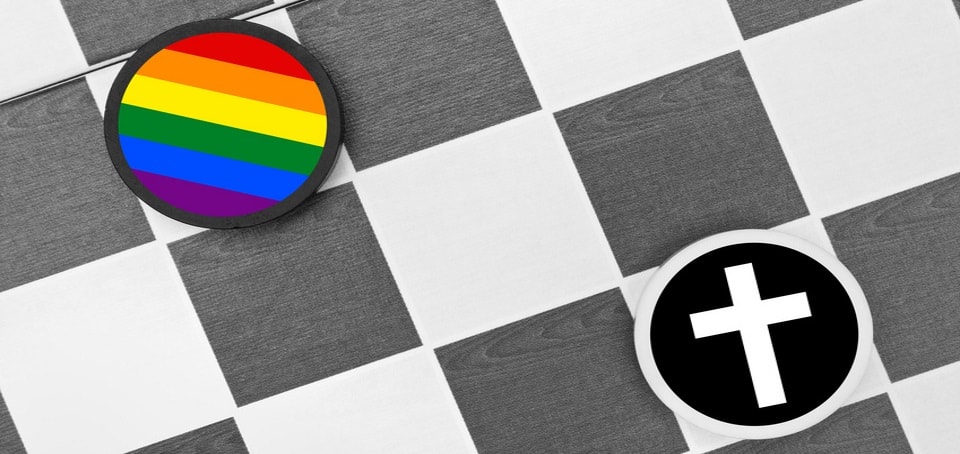The relationship between the LGBT community and the religious community can be a very complicated one; however it is important to understand the interaction. It is also important to realise that within any community there are voices which may be more progressive or more conservative.
People within each religious community can hold independent view points, so community members may not all hold exactly the same opinion. Overall, religious communities strive to promote love, compassion, tolerance and community spirit. This means that people may still be loving, welcoming and friendly towards LGBT individuals, even if they consider that being LGBT is wrong.
Christian Religions in the United Kingdom
Some sections of the catholic doctrine in the United Kingdom still consider homosexuality and transgender identity to be a sin. This is in part because of the belief that sexual relationships are intended as a way to procreate.
The central church teachings suggest that people can be homosexual as long as they do not act upon their orientation. Leading figures in the Catholic Church have actively opposed the introduction of same-sex marriages, as the Catholic Church teaches that marriage can only be between a woman and a man. On the other hand, an increasingly large group of Catholics in the UK are beginning to reject the idea that homosexuality is sinful. The Catholic Church will allow closeted gay men to be priests, as long as they have lived as chaste lifestyle for at least three years. All priests must take a vow of chastity, regardless of their sexuality.
The Church of England has a more mixed position on LGBT rights. The Church currently allows gay men and women, and trans men and women to serve in the clergy. Gay priests are allowed to enter into civil partnerships, but they are not allowed to have religious marriage ceremonies. The Church of England will allow blessings and prayers after same-sex marriage ceremonies, but they will not perform full religious marriage ceremonies for same-sex couples. The Church of Wales and the Church of Scotland have similar stances.
Muslims in the United Kingdom
Muslims in the United Kingdom generally have a more progressive view about LGBT than those who live in Islamic countries. However, the Quran does declare that certain homosexual acts are forbidden under Islam.
Whilst the Muslim Council of Britain continues to believe that homosexuality is forbidden according to the teachings of Islam, the council advises that discrimination on the grounds of sexual orientation is not appropriate. Although there are very few openly gay Muslims in the United Kingdom, there have been a few same-sex ceremonies performed where at least one of the parties has been a practicing Muslim.
Judaism in the United Kingdom
Views on homosexual and trans people in Judaism will normally depend on whether the person is a follower of Orthodox Judaism or a reformed Jewish denomination. Most Orthodox Jewish people in the United Kingdom consider that homosexuality is contrary to Jewish teachings. On the other hand, there are a number of openly gay and trans members of the clergy practicing in the UK. Jewish groups also tend to be present at LGBT pride events. The history of LGBT Jews in the UK can be traced back to the 1950s.
Sikhs in the United Kingdom
Although there are no specific teachings about homosexuality in the Sikh Holy Scripture, Sikh philosophy promotes respect, tolerance and oneness with all people. There are no barriers to living a healthy family lifestyle within a same sex relationship, as long as other traditional Sikh values are cultivated.
Mormons in the United Kingdom
Mormon doctrine teaches that sexual activity outside of marriage is sinful, and the Mormon Church only allows marriage between a man and a woman. Whilst Mormonism in the United Kingdom does not explicitly state that it is wrong to be gay, the law of chastity means that gay people are unable to consummate their relationships. Mormon teachings about sexual activity also include most types of passionate kissing and the use of any erotic materials. This means that it is very difficult for gay Mormons to explore their sexual desires.
Hindus in the United Kingdom
Many Hindus believe that homosexuality is a normal expression of human desires, and that homosexuality should be embraced. However, there are a few Hindu groups that believe homosexuality is wrong, although this is mainly down to external influences. There are several Hindu texts and ancient carvings which represent people in same-sex relationships or engaging in homosexual acts. These are portrayed positively. Hindu teachings are also open to ideas about gender variance, and there are many Hindu people who do not fit into the traditional British binary gender structure. Some Hindu groups are very welcoming of the idea of third gender individuals, although Queer non-Hindu individuals must take care not to appropriate these ideas without proper cultural understanding.

